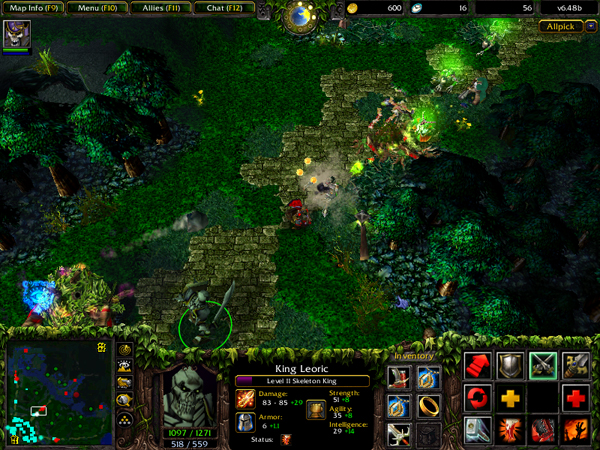Ignore them if you want, but MOBAs are a huge deal.
I mean, a Dota 2 tournament made the front page of the New York Times yesterday. It almost seems like a silly feat for such a (deceptively) simple kind of game. The multiplayer online battle arena genre, after all, really does have incredibly humble origins.
Of course, not everyone knows exactly how MOBAs grew from obscurity to become the biggest sensation in PC gaming today. That’s why we created this look at MOBA history for you. You’ll see how the genre started, learn about the games that turned it into a money-making machine, and get a look at how it’s impacting the industry’s future.
Of course, it might help you if you knew exactly what a MOBA was. While the exact details can vary, most MOBAs pit two teams of player-controlled heroes (usually with five members each) against each other on a simple map with three roads (called lanes) connecting each team’s base. Heroes have to fight their way through computer-controlled minions, turrets, and the enemy team to reach the other base and destroy it. Along the way, they’ll earn experience points and new skills, gold, and equipment, and they can destroy certain monsters in the jungle (the area between lanes) for temporary stat boosts.
It sounds simple, but it’s actually an incredibly complex and challenging, competitive experience. Now, let’s learn how it came to exist.
Aeon of Strife
In 1998, a modder called Aeon64 created Aeon of Strife, a fan-made custom map for Blizzard’s real-time strategy game StarCraft. In it, players controlled a single hero unit and fought with a team against computer-controlled units in three lanes. These lanes connected the bases of two teams. The objective was to destroy the other team’s base.
While Aeon of Strife created the groundwork for the MOBA genre, it had some notable differences from what we’d expect from a true MOBA today. For one thing, teams had four players each instead of five. Also, Aeon of Strife wasn’t a competitive game. Instead, one team of player-controlled heroes went up against a team of computer-controlled characters. Heroes also didn’t level up as the game progressed, and you didn’t see a jungle of extra creeps (gamer lingo for computer-controlled monsters) and roads between the three lanes.
Defense of the Ancients
In 2002, Blizzard released its next real-time strategy game, Warcraft III. Like StarCraft, it came with tools that enabled players to create custom maps and scenarios. In 2003, a map editor named Eul created a mod inspired by Aeon of Strife called Defense of the Ancients. Soon, other players would create their own version of Defense of the Ancients (often called Dota), each adding his own heroes, items, and other differences.
Like Aeon of Strife, Dota enabled players to control a powerful hero unit and battle an opposing team across three lanes that connected each side’s base. However, Dota pit two teams full of player-controlled characters against each other. It also had five players on each team, enabled heroes to level up as they earned experience, and had a jungle full of creeps between lanes. It’s pretty much exactly what you’d see from a MOBA today.
Eventually, a modder named Steve Feak, who went by the handle Guinsoo, created Dota Allstars. This version combined elements from multiple variations on Dota, and it quickly became the most popular version of the map.
However, Dota Allstars was still a mod for Warcraft III. This means that it depended on all the assets from that game, so it could never feature a hero character that used a completely new model, nor could it give any of the creators who worked on it a monetary profit. Feak would eventually leave development of the map to another modder named IceFrog. Under IceFrog’s guidance, Dota continued to grow in popularity as it became a more balanced game.
Demigod
Others began to take notice of Dota’s popularity. Soon, standalone games would try to replicate its success. The first notable one was 2009’s Demigod, a MOBA before the term was ever coined. At this point, most gave the genre the same name as the game that popularized it, Dota.
Demigod was similar to the Warcraft III map in many ways, with Demigods (giant statue-like creatures) acting as the hero units. However, server issues at the game’s launch prevented many players from connecting to online games. Partially because of these issues (it also didn’t help that its main competitor was a free map that any Warcraft III owner could download), Demigod never really caught on.


